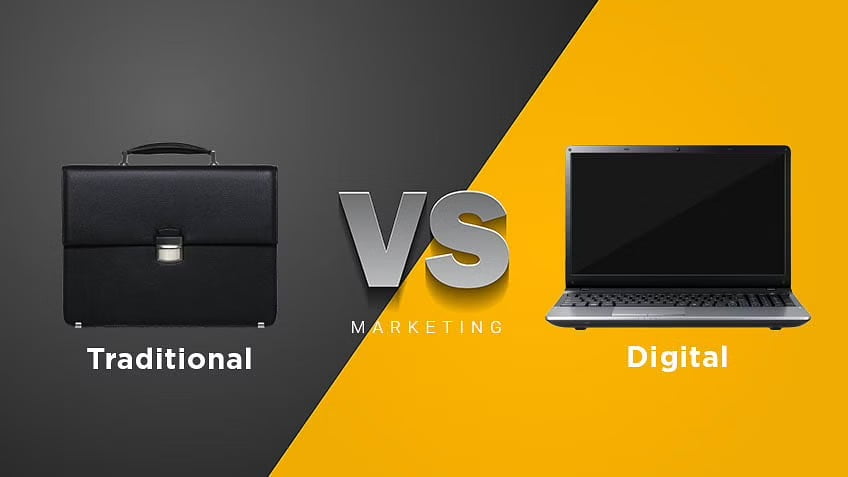
The world is transforming digitally, and we can see an immense shift from traditional ways of working to digital, whether it is in education, entertainment, or even marketing. There is an ongoing debate about which method of marketing is better. Has digital marketing completely supplanted traditional marketing, or does traditional marketing still have a future?
If you are also confused about which one to choose for your business—traditional or digital marketing—read this post till the end for a better understanding of both techniques.
Traditional marketing: It is the technique of promoting a brand, product, or service through traditional channels such as billboards and print media (magazines, pamphlets, newspapers, TV commercials, etc.). Traditional marketing was the only prevalent marketing technique till the introduction of the internet to the common masses in the late 1990s.
Traditional marketing channels include:
- Outdoor: billboards, bus/taxi wraps, posters, etc.
- Broadcasting-TV, radio, etc.
- print magazines, newspapers, etc.
- Catalogs, pamphlets, and other forms of direct mail
- Telemarketing-Phone, Text Messages
- Window displays and signs
Pros:
Hold A Powerful Impact: Watching visually pleasing billboard ads and impactful TV commercials daily creates a powerful impact on us and become a part of our daily lives.
Easy to Understand and Remember: Because TV and radio commercials are longer in length, they are easier to understand and relate to. We remember these advertisements because they are hard to ignore and because catchy jingles stay with us for a longer duration of time.
Long-Lasting Marketing Material: Printed marketing materials such as magazines and newspapers remain with us until they are recycled.
Cons:
Difficult to Analyse: One of the major drawbacks of traditional marketing campaigns such as newspaper and radio advertisements is that analysis of their impact on the target audience is difficult to track. On the other hand, we have various tools to track the impact of digital marketing campaigns.
Relatively More Expansive: Another reason brands are shifting to digital marketing is the cost of production of traditional marketing campaigns. Since these campaigns involve higher quality equipment and manpower, they become relatively expansive as compared to digital marketing campaigns, which can be circulated in hundreds of copies without an extra cost.
Lack of Personal Connection with the Consumer: Since traditional campaigns are mostly for the masses, in one way, they lack a personal connection with the customer. On the other hand, brands can get reviews and feedback in the form of direct messages and comments on social media platforms or through chatbots on websites.
Digital Marketing
Digital marketing is the technique of promoting a brand, product, or service through digital channels such as websites, social media platforms, and more. Any business can get access to digital media and promote their business through content, free and paid advertisements, influencer marketing, SEO, PPC, social media marketing, email marketing and other marketing strategies. Most people use the internet for information, knowledge, entertainment, and shopping. Therefore, digital marketing provides higher chances of conversion than traditional marketing.
Pros:
More Personal Connection with the Audience: Digital marketing channels such as social media allow brands to interact with their audience on a more personal level through live chats, comments, and direct messages, which traditional marketing does not allow.
Digital Marketing Campaigns Are Easy to Measure: Digital marketing campaigns are easy to measure, which means you can analyse the impact of a particular ad campaign or post and make further changes to your strategies.
Target Audience at The Right Time: Digital marketing has the ability to target both broad and specific audiences at the right time and through the right channel. For instance, social media platforms such as Instagram and Facebook offer you the ability to select your audience based on demographics such as age group, income, and other factors.
Affordable and time-efficient: Since you can create digital campaigns with minimum resources, they are cost-efficient and time-efficient to produce and show results.
Cons:
the number of Similar Campaigns: One of the major drawbacks of digital marketing is that it offers multiple options to your audience, which can make it difficult for you to surpass your competition.
Temporary Impact: Since there is an abundance of digital marketing campaigns in the form of Google ads and Facebook ads, it becomes difficult to hold the attention of your audience for a long time.
Keep Evolving: the criteria for growth on digital platforms keep on changing. Therefore, it becomes difficult to produce similar ads again and again. Brands need to keep updating their strategies according to the present requirements, which is not the case in traditional marketing, as you can run an ad campaign for years.
What Should You Choose?
Having knowledge of the pros and cons of both traditional marketing and digital marketing, we understand that none of the techniques are wholesome in themselves and that they go hand in hand. All you need to do is to create a balance between the two techniques, for which you need to understand your audience and target them through the right channel. Creating a blend of traditional and digital marketing strategies is the perfect answer.



0 Comments